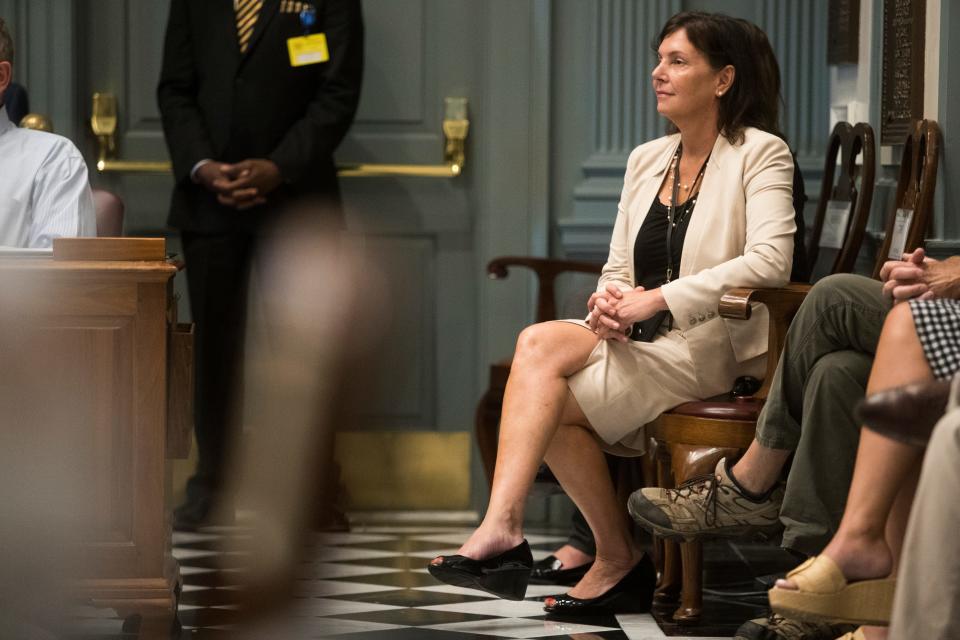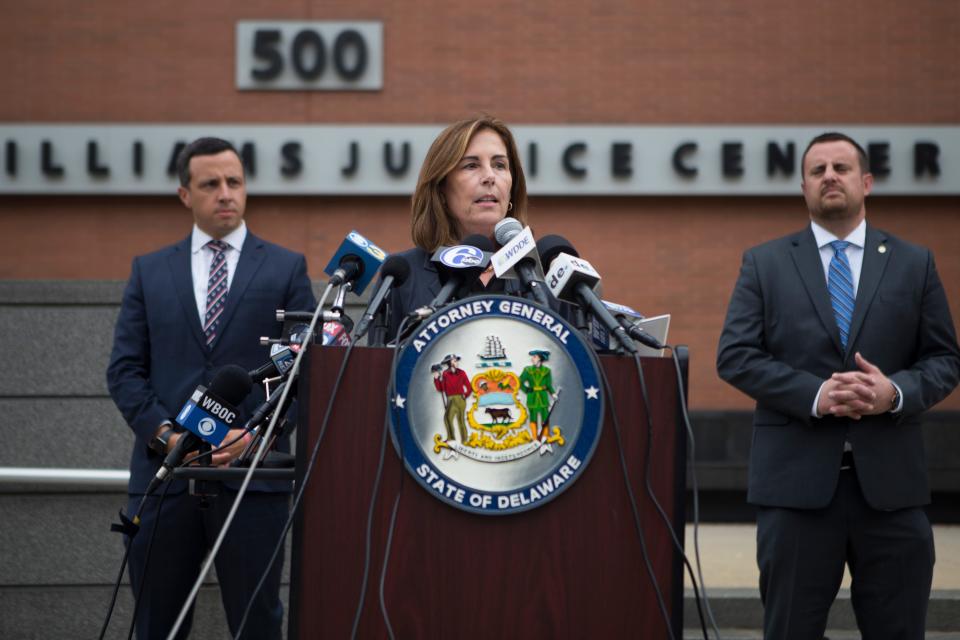Former state auditor sues Delaware attorney general for defamation tied to criminal case
- Oops!Something went wrong.Please try again later.
- Oops!Something went wrong.Please try again later.
Former Delaware Auditor Kathy McGuiness is suing Attorney General Kathy Jennings and other state law enforcement officials for alleged violations of her constitutional rights as well as defamation tied to the criminal case that preceded the auditor's election loss last year.
Last year, McGuiness was convicted of three misdemeanors tied to her work as auditor in a locally-unprecedented prosecution against a statewide-elected official. The prosecution was led by Jennings and the state's top public corruption watchdogs and centered on allegations that McGuiness gave her child a do-little job in the office, criminally intimidated her employees and rigged payments for a state contract to avoid oversight.
She was convicted of crimes associated with hiring her daughter and the state-contract payments, but the presiding judge tossed the conviction tied to the contract payments. She was sentenced to probation and lost her reelection bid. The Delaware Supreme Court is currently considering an appeal of her remaining convictions.
The lawsuit, filed Tuesday, names as defendants Chief Investigator Frank Robinson in the Department of Justice's Office of Civil Rights and Public Trust, the state's primary public corruption watchdog as well as Mark Denney, a prosecutor who until recently ran that office. Attorney General Jennings, a longtime prosecutor who has been the state's top law enforcement official since 2019, is also named as a defendant.
Editor's Note: Read the complaint at the bottom of this story.
The complaint, which was filed by Dover-attorney Ron Poliquin, claims that Robinson and other officials under Jennings included false statements that they knew or had reason to believe were incorrect in a sworn search warrant affidavit that led to the confiscation of McGuiness' laptop as well as other electronics from her office before charges were filed.
These false statements violated McGuiness's constitutional rights and warrant damages that are unspecified in the complaint, according to the lawsuit.

Additionally, the litigation accuses Jennings and Denney of defamation for how they characterized the criminal charges tied to the state contract payments in a press conference in 2021 announcing the indictment against McGuiness. The complaint claims the false statements damaged McGuiness' political career.
McGuiness did not reply to a text message seeking comment.
"This is yet another sad, desperate, and wasteful attempt by the ex-Auditor to change the consequences of her actions," said Mat Marshall, a spokesperson for Jennings, in a written statement. "We’ve heard this tirade before. It was rejected and she was convicted by a jury of her peers. That she continues to proclaim her innocence is not news.”
In a written statement, Denney, who recently left the Department of Justice, called the lawsuit "frivolous."
"No matter how much McGuiness and her current and former attorneys want to spin and relitigate the case — and feign confusion over her structuring conviction — the jury understood it," Denney wrote.
Structuring charge center to lawsuit:
The allegations of the lawsuit center around the criminal charge prosecutors referred to as "structuring."
It was one of three foundational bad acts associated with the allegations against McGuiness. The others were hiring her daughter to work in the office, which she was convicted of, and retaliating against employees who knew about or sought to report her wrongdoing, a felony which she was acquitted of.
McGuiness has sought to minimize those charges by noting that other public officials, particularly in the Delaware General Assembly, engage in nepotism and that the people who accused her of intimidation were insincere.
Compared to those bad acts, the structuring allegation carried the most overt criminal act: a statewide elected public official using the purse and power of her office to promote her own political brand and taking steps to hide that spending from state regulators.
The crime got top billing in Jennings statements to the press announcing the charges. Jennings went into the background of how consultant Christie Gross and her firm, My Campaign Group, first worked with McGuiness during McGuiness' failed 2016 campaign for Lieutenant Governor.
Jennings said once McGuiness assumed the role of State Auditor in 2019, she went back to Gross and "informed her of a loophole that would allow them to avoid the competitive bidding process" by structuring a contract with the Auditor's Office under the $50,000 threshold over which state contracts must be competitively bid.
Editor's Note: The video at the top of this story is from that press conference.
Jennings also accused McGuiness in the press conference of structuring payments within that contract to avoid oversight by state officials in the Division of Accounting.
Evolving allegation of misdeeds
Jennings called it a "sweetheart deal," but when it comes to the actual law, the crime was something prosecutors seemed to have trouble describing in court documents.
Charging papers never accused McGuiness of breaking the law by circumventing state bidding rules and instead focused on payments made pursuant to the contract with Gross, accusing McGuiness of splitting those payments up so they were less than the $5,000 threshold that triggered an additional review by state regulators.
The indictment specifically referenced payments in August and September of 2020, which prosecutors alleged were knowingly fragmented to avoid scrutiny. The indictment came down in September 2021.
In the following months, prosecutors began to share evidence with McGuiness's defense attorneys. Eventually, it became clear that prosecutors were incorrect and that the August and September payments were over $5,000 and approved by Division of Accounting regulators.
Prosecutors then reindicted McGuiness, changing the alleged bad act to splitting payments between funding sources and eventually took her to trial based on those charges.
At trial, prosecutors accusations eventually centered on certain forms that were not submitted alongside some of the payments. But trial testimony showed comparable paperwork problems are common, happen on a much larger scale in state government and don't result in criminal prosecution.
Still, the jury found McGuiness guilty of structuring.
Months later, presiding Judge William C. Carpenter, now retired, threw out the conviction. His opinion tracked the state's changing theory on what exactly about the payments were criminal, noting there may have been paperwork infractions, but concluded that there was "no evidence" of intentional manipulation to avoid accounting review.
“The situation here was simply a comedy of errors and not criminal conduct," Carpenter wrote.
Incorrect search warrant argument
The basis of the constitutional violations alleged by McGuiness' lawsuit are incorrect statements about the structuring charge in an affidavit submitted by Department of Justice prosecutors to a magistrate for permission to execute a search warrant on McGuiness' office ahead of filing criminal charges.
Police must show cause to search an office, home or property generally. They do that through an affidavit that lays out what they want to search, why they want to search it and why they believe the search will produce evidence of criminal conduct. The author of those affidavits must swear that the information included is true.
In McGuiness' case, investigators applied for a search warrant to seize her laptop and other electronic devices from her office in September 2021, weeks before she was charged.
In the accompanying affidavit, Robinson, the DOJ investigator, wrote that payments to My Campaign Group had been structured to avoid scrutiny in August and September of 2020.
By then, the Division of Accounting had turned over to investigators information that showed that was not true. At trial and in hearings preceding the trial, Robinson conceded that investigators should have known better, but did not intentionally seek to deceive.
The affidavit also included what the lawsuit essentially characterizes as a lie of omission.
The search warrant sought video surveillance from McGuiness' office and, to justify that, Robinson wrote in the affidavit that an employee that was friends with whistleblowers in the case had reported that a notebook had been stolen from their desk.
However, Robinson also knew at the time that police had investigated the reported theft, viewed records from the video system, concluded that those records did not depict theft and that the reporting employee was "10-81," police code for "crazy," according to the lawsuit.
The lawsuit states that absent the false statements about both the contract payments and notebook theft, there would have been no probable cause to execute the search warrants and that those lies violate McGuiness' Fourth Amendment rights.
Steve Wood, McGuiness' defense attorney took the issue further.
He emphasized that he is not representing McGuiness in the civil lawsuit, but said the former auditor spent "a hell of a lot of money defending herself on a structuring charge" which was first based on "false allegations" and then based on a "wholly bogus theory of law" that led Carpenter, the judge, to toss the conviction.
"She was always innocent of structuring," Wood said.
The contested search warrant and Carpenter's handling of the fallout is also central to McGuiness' post-conviction appeals. Delaware's Supreme Court is set to hear oral arguments in the appeal in September.
Defamatory statements made by prosecutors, suit says
The lawsuit also accuses Jennings and Denney of defamation, centering on statements they made about the structuring charge at the press conference announcing the indictment.
Specifically, the complaint picks out Jennings statements about McGuiness structuring payments to avoid oversight.

It states that Jennings and Denney had information that showed that was not true and either "intentionally or recklessly" failed to determine the truth by the time the press conference was held.
The lawsuit adds that McGuiness's career has been harmed and she has also been forced to hire an attorney. McGuiness was defeated in the Democratic primary for the auditor's office last year.
Contact Xerxes Wilson at (302) 324-2787 or xwilson@delawareonline.com.
McGuiness v. McGuiness, civil court by Xerxes Wilson on Scribd
This article originally appeared on Delaware News Journal: Former Delaware auditor Kathy McGuiness sues AG for defamation

